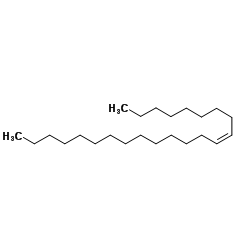(9Z)-9-Tricosene

(9Z)-9-Tricosene structure
|
Common Name | (9Z)-9-Tricosene | ||
|---|---|---|---|---|
| CAS Number | 27519-02-4 | Molecular Weight | 322.61 | |
| Density | 0.8±0.1 g/cm3 | Boiling Point | 399.4±9.0 °C at 760 mmHg | |
| Molecular Formula | C23H46 | Melting Point | N/A | |
| MSDS | Chinese USA | Flash Point | 208.8±9.7 °C | |
| Symbol |

GHS07 |
Signal Word | Warning | |
|
Field evaluation of (Z)-9-tricosene, a sex-attractant pheromone in bait combination for the control of houseflies in Gazipur dairy area Delhi, (India).
J. Commun. Dis. 12(3) , 109-17, (1980)
|
|
|
(Z)-9-tricosene identified in rectal gland extracts of Bactrocera oleae males: first evidence of a male-produced female attractant in olive fruit fly.
Naturwissenschaften 99(1) , 77-81, (2012) It is well-known that Bactrocera oleae (olive fruit fly) females attract conspecific males by using 1,7-dioxaspiro[5,5]undecane (1) as the main component of their sex pheromone, and that 1 is produced in the female rectal gland. Although some authors have cla... |
|
|
Unusual mechanism of hydrocarbon formation in the housefly: cytochrome P450 converts aldehyde to the sex pheromone component (Z)-9-tricosene and CO2.
Proc. Natl. Acad. Sci. U. S. A. 91(21) , 10000-4, (1994) An unusual mechanism for hydrocarbon biosynthesis is proposed from work examining the formation of (Z)-9-tricosene (Z9-23:Hy), the major sex pheromone component of the female housefly, Musca domestica. Incubation of (Z)-15-[1-14C]- and (Z)-15-[15,16-3H2]tetra... |
|
|
Visual responses of Musca domestica to pheromone impregnated targets in poultry units.
Med. Vet. Entomol. 13(2) , 132-8, (1999) Field trials investigating the effect of visual cues on catches of Musca domestica (Diptera: Muscidae) at toxic targets impregnated with the female sex pheromone (Z)-9-tricosene, were conducted in a caged-layer deep-pit poultry unit in southern England. Targe... |
|
|
Field trials of pheromone-toxicant devices containing muscalure for house flies ((Diptera: Muscidae).
J. Med. Entomol. 18(1) , 73-7, (1981)
|
|
|
Assessing insecticide resistance and aversion to methomyl-treated toxic baits in Musca domestica L (Diptera: Muscidae) populations in southern California.
Pest Manag. Sci. 60(9) , 901-8, (2004) Progeny of house flies (Musca domestica L) from ten California poultry operations, three dairies and one horse-riding facility were tested for methomyl- and muscalure-treated bait resistance using up to three different assays: a topical assay, a no-choice fee... |
|
|
House fly (Diptera: Muscidae) activity near baits containing (Z)-9-tricosene and efficacy of commercial toxic fly baits on a southern California dairy.
J. Econ. Entomol. 100(4) , 1489-95, (2007) Sticky card captures of house flies, Musca domestica L. (Diptera: Muscidae), were used to compare efficacy of screen-covered baits containing sugar, sugar and 0.1% (Z)-9-tricosene, sugar and 1.0% (Z)-9-tricosene, Golden Malrin [1.1% methomyl and 0.049% (Z)-9-... |
|
|
Evaluation of fly-electrocuting black light devices in caged-layer poultry facilities.
Poult. Sci. 67(6) , 871-7, (1988) Insect-electrocuting black light devices were evaluated for their effectiveness in killing flies in caged-layer poultry facilities. Concurrently, the effect of the addition of the attractant muscalure (Z-9-tricosene) to these devices on their fly-killing effi... |
|
|
Regulation of sex pheromone biosynthesis in the housefly, Musca domestica: relative contribution of the elongation and reductive steps.
Arch. Biochem. Biophys. 299(1) , 92-9, (1992) The regulation of production of the sex pheromone (Z)-9-tricosene (Z9-23:Hy) in the housefly, Musca domestica, was studied by examining the chain length specificity of the fatty acyl-CoA elongation reactions and the reductive conversion of fatty acyl-CoAs to ... |
|
|
Effect of the entomopathogenic fungus, Entomophthora muscae (Zygomycetes: Entomophthoraceae), on sex pheromone and other cuticular hydrocarbons of the house fly, Musca domestica.
J. Invertebr. Pathol. 80(3) , 171-6, (2002) House fly (Musca domestica) males are highly attracted to dead female flies infected with the entomopathogenic fungus Entomophthora muscae. Because males orient to the larger abdomen of infected flies, both visual and chemical cues may be responsible for the ... |